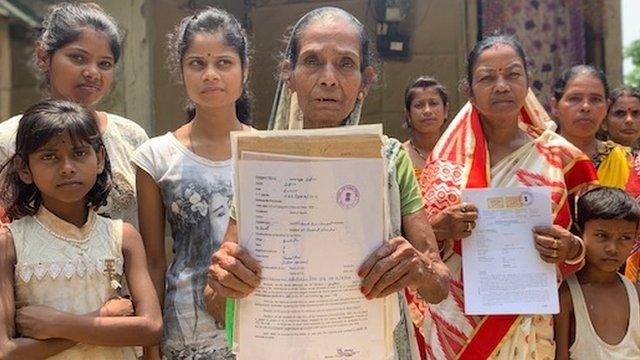India court releases army veteran detained as foreigner
- Published
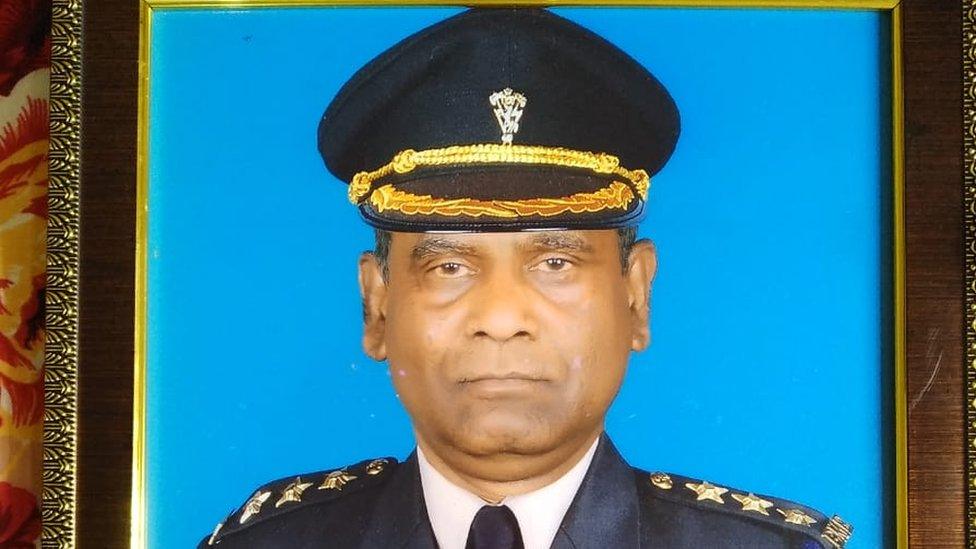
Mohd Sanaullah was a decorated army veteran
A high court in India has ordered the release of a decorated Indian army veteran who was hauled off to a detention camp after being declared a "foreigner" under a controversial measure. BBC Hindi's Vineet Khare reports on how the man's arrest has outraged India.
It was the evening of 27 May and Mohd Sanaullah, 52, had just reached his home in Guwahati in the north-eastern Indian state of Assam, when he got a call from the local police superintendent's office.
The man on the other end of the line told Mr Sanaullah that the state's foreigners tribunal had declared him a "foreigner" four days ago and asked him to report there.
"He knew what lay ahead," Mr Sanaullah's lawyer and son-in-law, Shahidul Islam, who was with him in Guwahati at the time of his arrest, told the BBC.
He spent the night in police custody.
On Friday, the high court in Assam granted Mr Sanaullah bail. But his lawyer told the Indian Express newspaper that his appeal challenging his detention in the first place is still pending.
Mr Sanaullah is one of four million people who was left off the latest draft of the National Register of Citizens (NRC) published last year. The NRC was first created in 1951 to determine who was born in India and who might be a migrant from neighbouring, Muslim-majority East Pakistan, now known as Bangladesh.
'The Indian government is tearing my family apart'
The census, conducted only in the north-eastern state of Assam, counts as citizens those who can prove that they were residents of India before midnight on 24 March 1971, a day before Bangladesh declared its independence from Pakistan.
An army veteran with 30 years of service, Mr Sanaullah was working as an officer with the border police - a unit of the state police service - when the call came.
Ironically, one of its main jobs is to stem illegal migration from Bangladesh.
Mr Sanaullah was dispatched to a detention centre the next day, where he has been ever since. There are hundreds of people, also declared foreigners, who are in six detention centres around the state.
Even though the most recent version of the NRC was only published in 2018, Assam has a history of trying people suspected to be foreigners. For decades, it did so under a 1983 law, until it was repealed in 2005. The detention centres were set up in 2009 because of fears that those declared "foreigners" would try and escape.
Many have been languishing there for years.
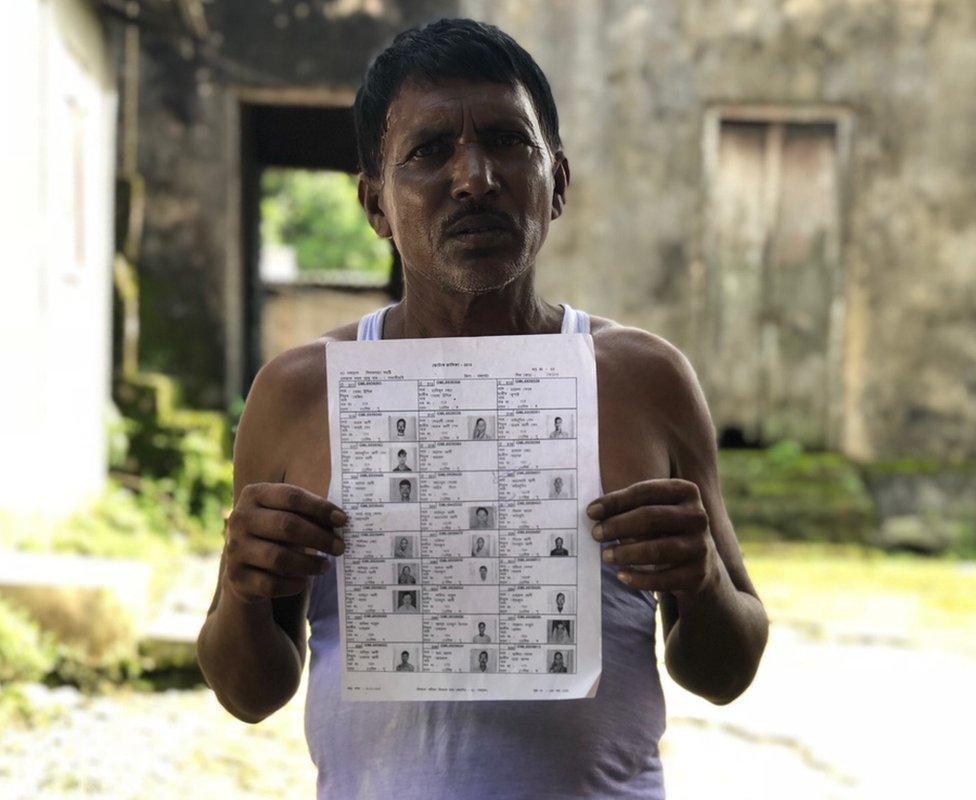
Activists allege that the list is a "conspiracy" to target minorities
But Mr Sanaullah was luckier than most. His story caught the attention of national media, which began flashing headlines that a "war hero" in the state had been declared a foreigner.
Outrage quickly followed.
A leader from India's main opposition Congress party said Mr Sanaullah's detention was an "insult" to India's armed forces,, external adding that it demonstrated that the NRC had been compiled in a "high-handed and flawed" manner.
Others asked if the purpose of the NRC was to identify illegal migrants or label all Muslims as illegal immigrants.
Officials are quick to point out that tens of thousands of Hindus were also left off the list. But critics cite the Citizenship Amendment Bill, which seeks to provide citizenship to non-Muslim migrants from Pakistan, Bangladesh and Afghanistan.
In fact the bill was shelved after people in Assam vehemently protested against it fearing that Hindu migrants who were not included in the NRC would still get citizenship to stay on.
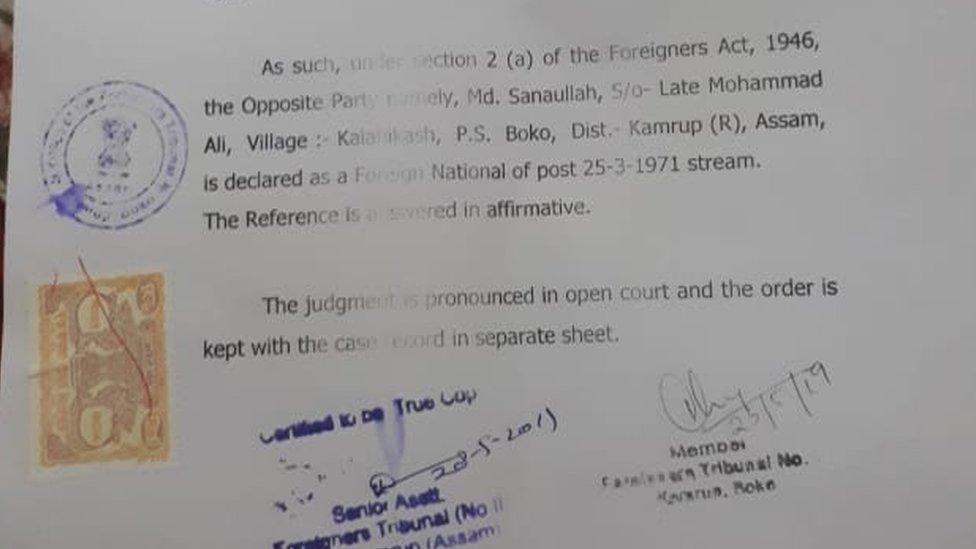
The case against Mr Sanaullah is being disputed now
As news of Mr Sanaullah's detention spread, the country's top court also got involved, expressing its "serious concern". It summoned the state's co-ordinator of the NRC and asked him to ensure that the process by which people were deemed foreigners or not was carried out properly.
Mr Sanaullah's case documents revealed that the case against him was built on the basis of "witness statements" questioning his nationality. These statements were made in 2008 and 2009 by three people in his home village.
The documents also contain an alleged "confession" where Mr Sanaullah reportedly said that he is actually from a village near the Bangladeshi capital Dhaka.
But these are all being questioned now.
For one, all three "witnesses" are flatly denying making any statement against Mr Sanaullah to the investigating officer, who has been identified as Chandramal Das.
"Sanaullah was like family to us. Why would I give a statement against him? I never met Chandramal Das or even heard his name until now," Sobahan Ali told the BBC.
Another, Quran Ali, said he was mystified to learn his name was given as that of a witness because he had not even been living in the village at the time that he was supposed to have made this statement.
They say their names have been misused and their signatures forged on the document.
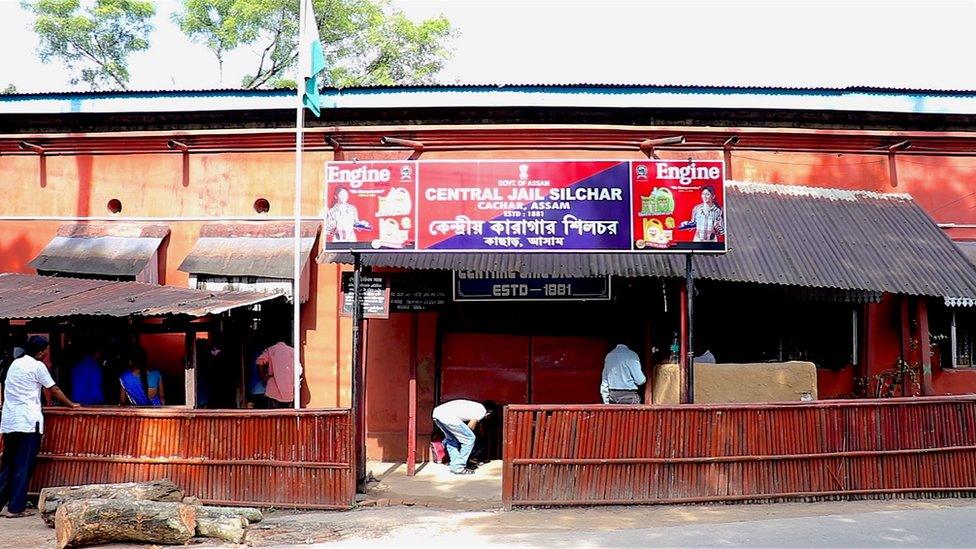
One of the detention camps is in the central jail
Mr Sanaullah's family also deny he ever made any "confession" about his birthplace to anyone.
These revelations have now prompted police to register a case against Mr Das.
Mr Das, who retired last year, told the NDTV news channel that the entire thing was a "mix-up of reports" - and that he had meant to investigate another man whose name was Sanaulla (both names would be spelled the same in the local language).
Living in limbo: Assam's four million unwanted
"My father only heard of the probe in 2018 when his name didn't figure in the NRC draft list," Mr Sanaullah's daughter Shehnaz Akhar told the BBC.
"It was only when he went to the NRC office that he found out that there was a 10-year-old case against him."
Hafiz Rashid Ahmed Choudhary, a senior lawyer at the Guwahati high court in Assam, says that this case is hardly unique and that there are hundreds of people like Mr Sanaullah who are languishing in detention camps.
"It's happening because of lapses on the part of the agencies. Police officials lack knowledge and sometimes act in a biased manner. And the Foreigners Tribunals are manned by members who give verdicts but have little experience. The minimum experience to be a member is seven years."
- Published30 July 2018
- Published21 May 2019
